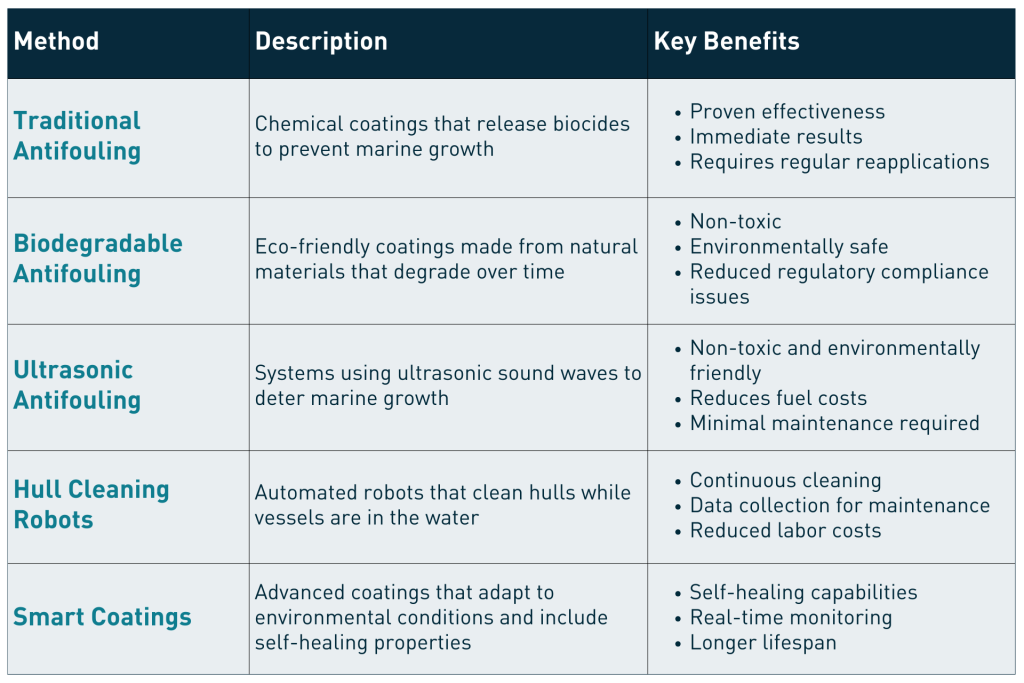BLOG
In today’s maritime industry, sustainability is more than just a buzzword – it’s a necessity. As environmental regulations tighten and the demand for eco-friendly practices rises, vessel operators are seeking innovative solutions for their hull maintenance without compromising performance or harming marine ecosystems. From biodegradable antifouling to automated cleaning technologies, the options are vast and each method has its distinct features and benefits that cater to various operational needs.
Exploring five different hull maintenance and protection methods

Here, we explore five different hull protection and maintenance methods:
1) Traditional Antifouling
Traditional antifouling paints typically contain biocides, such as copper compounds, to deter organisms like barnacles and algae. While effective, traditional antifouling methods often require annual reapplication and can have significant environmental impacts due to the toxicity of the chemicals used.
2) Biodegradable Antifouling
Biodegradable antifouling solutions are designed to prevent the growth of marine organisms on vessel hulls without using toxic chemicals. These products are typically made from natural substances that degrade over time, offering a sustainable alternative to traditional antifouling paints that contain harmful biocides. With increasing regulations against harmful antifouling agents, biodegradable options help vessel operators comply with environmental standards.
3) Ultrasonic Antifouling
Ultrasonic antifouling systems utilize ultrasonic sound waves emitted from transducers attached to the hull. These sound waves create microcurrents that prevent marine organisms from attaching, significantly reducing biofouling. This method is environmentally friendly, causing no harm to marine life and eliminating the need for toxic chemicals. Ultrasonic systems can reduce maintenance needs and fuel costs by keeping hulls clean for longer periods.
4) Hull Cleaning Robots
Hull-cleaning robots are automated devices to clean vessel hulls while in the water. These robots use brushes or scrapers to remove fouling organisms without requiring dry-docking or manual labor. They provide continuous cleaning and can collect data on hull conditions, allowing for better maintenance planning. This technology reduces labour costs and enhances safety by minimizing human intervention.
5) Smart Coatings
Smart coatings are advanced materials that respond dynamically to environmental conditions. They can include self-healing properties, allowing them to repair minor damage autonomously. These coatings improve durability and performance by adapting to changing marine environments, offering a longer lifespan compared to traditional antifouling paints while minimizing maintenance needs.
Australia has implemented several legislative measures to regulate the use of antifouling agents in order to protect marine environments. The primary legislation governing this area is the Protection of the Sea (Harmful Anti-fouling Systems) Act 2006, which aligns with the International Convention on the Control of Harmful Anti-fouling Systems on Ships (HAFS Convention). This Act prohibits the use of harmful organotin compounds, such as tributyltin (TBT), in antifouling paints and establishes mechanisms to prevent the use of other harmful substances. In December 2022, amendments were made to further control substances like cybutryne, reflecting ongoing efforts to enhance marine protection.
Traditional antifouling methods have served us well, but with increasing environmental awareness and regulatory pressures, it’s time to embrace new technologies that not only protect our vessels but also safeguard our oceans.
Choosing the right hull maintenance strategy is not just about keeping your boat clean and efficient, it’s about committing to sustainability and responsible stewardship of our marine resources. As you consider your options, think about how these innovative solutions can help you not only save time and money but also contribute to a healthier planet.
For expert advice on sustainability solutions for your fleet, schedule a consultation with our team or learn more about our Consultancy & Advisory Services.





